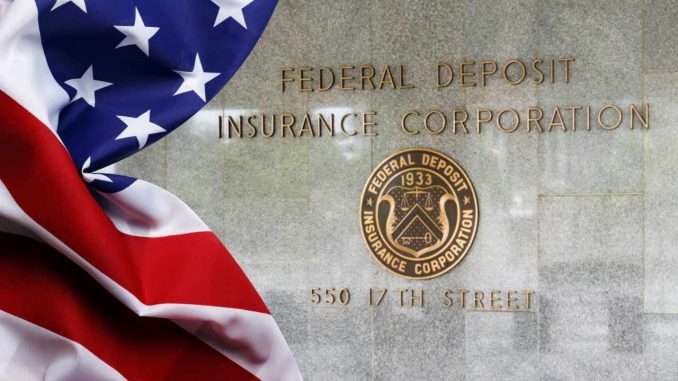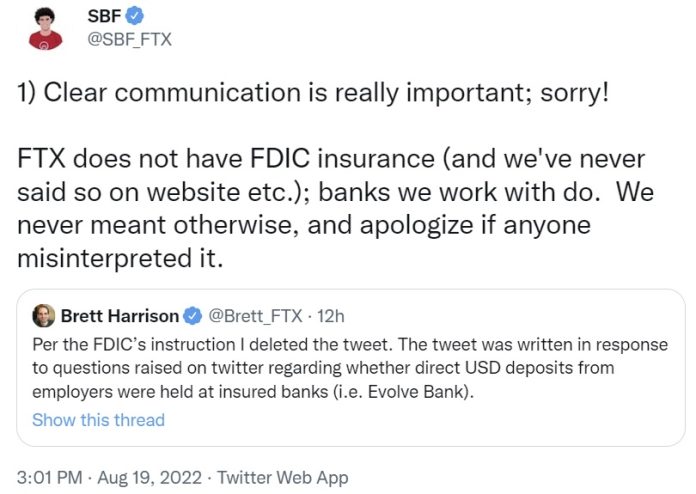
The Federal Deposit Insurance Corporation (FDIC) has despatched a stop and desist letter to 5 firms, together with crypto alternate FTX US. CEO Sam Bankman-Fried defined that FTX doesn’t have FDIC insurance coverage, stating: “We never meant otherwise, and apologize if anyone misinterpreted it … to be clear FTX US isn’t FDIC insured.”
FDIC Orders 5 Firms to Cease and Desist
The Federal Deposit Insurance Corporation (FDIC) issued crypto-related stop and desist orders to 5 firms Friday. The company regulates and insures the deposits of FDIC-insured neighborhood banks and different monetary establishments.
The letters demand that the 5 firms and their officers “cease and desist from making false and misleading statements about FDIC deposit insurance.” They should additionally “take immediate corrective action to address these false or misleading statements.”
The 5 firms are FTX US, Cryptonews.com, Cryptosec.data, Smartasset.com, and FDICCrypto.com.
The FDIC detailed:
Each of those firms made false representations — together with on their web sites and social media accounts — stating or suggesting that sure crypto–associated merchandise are FDIC–insured or that shares held in brokerage accounts are FDIC–insured.
According to the FDIC, Cryptonews.com has evaluations on its web site claiming that Coinbase, Etoro, and Gemini crypto buying and selling platforms are FDIC insured. Cryptosec.data and Smartasset.com present an inventory of FDIC-insured crypto exchanges that features Crypto.com, Luno, Robinhood, and Voyager. Meanwhile, FDICCrypto.com blatantly registered an internet site with FDIC in its area title.
FTX US Ordered to Cease and Desist
FTX US is among the crypto corporations that obtained a stop and desist letter from the FDIC.
Although FTX and FTX US are two separate buying and selling platforms, they’re each based by Sam Bankman-Fried, who’s at the moment the CEO of each firms. Global alternate FTX doesn’t enable U.S. residents to commerce on its platform.
Bankman-Fried apologized for the confusion concerning FDIC insurance coverage on Twitter. “Clear communication is really important; sorry!” he tweeted. “FTX does not have FDIC insurance (and we’ve never said so on website etc.); banks we work with do. We never meant otherwise, and apologize if anyone misinterpreted it.” In a follow-up tweet, he harassed: “To be clear, FTX US isn’t FDIC insured.”

This was not the primary time the FDIC has taken motion towards crypto firms. The regulator and the Federal Reserve Board issued a letter to Voyager Digital final month demanding the crypto lender stop and desist from making false or deceptive representations of deposit insurance coverage standing. Voyager filed for chapter safety final month.
What do you concentrate on the FDIC issuing crypto-related stop and desist orders to 5 firms? Let us know within the feedback part under.
Image Credits: Shutterstock, Pixabay, Wiki Commons
Disclaimer: This article is for informational functions solely. It just isn’t a direct supply or solicitation of a proposal to purchase or promote, or a suggestion or endorsement of any merchandise, companies, or firms. Bitcoin.com doesn’t present funding, tax, authorized, or accounting recommendation. Neither the corporate nor the creator is accountable, instantly or not directly, for any injury or loss induced or alleged to be brought on by or in reference to the usage of or reliance on any content material, items or companies talked about on this article.



